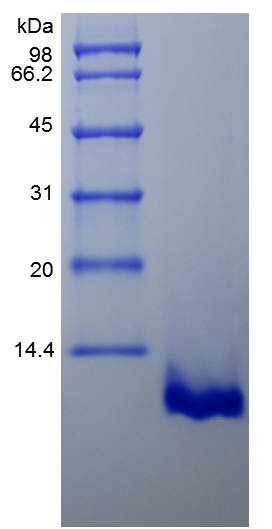- Synonyms
- STCP-1, MDC (1-69), Macrophage-derived Chemokine
- Source
- Escherichia coli
- Molecular Weight
- Approximately 7.8 kDa, a single, non-glycosylated polypeptide chain containing 68 amino acids.
- Size
- 5 µg/100 µg/500 µg
- AA Sequence
- GPYGANVEDS ICCQDYIRHP LPSRLVKEFF WTSKSCRKPG VVLITVKNRD ICADPRQVWV KKLLHKLS
- Purity
- > 97% by SDS-PAGE analyses.
- Biological Activity
- Testing in progress.
- Physical Appearance
- Sterile Filtered White lyophilized (freeze-dried) powder.
- Formulation
- Lyophilized from a 0.2 µm filtered concentrated solution in 2×PBS, 5% Trehalose, 0.02% Tween-20, pH 7.0.
- Endotoxin
- Less than 1 EU/μg of rMuMDC/CCL22 as determined by LAL method.
- Reconstitution
- Prior to opening, it is recommended to centrifuge the vial briefly to bring the contents down the bottom. Reconstitute in sterile distilled water or aqueous buffer containing 0.1% BSA to a concentration of 0.1-1.0 mg/mL. If animal-origin-free condition is expected in your product, then sterile distilled water is recommended. Stock solutions should be apportioned into working aliquots and stored at ≤ -20 °C. Further dilutions should be made in appropriate buffered solutions.
- Shipping
- The product is shipped with polar packs. Upon receipt, store it immediately at the temperature recommended below.
- Stability & Storage
- Use a manual defrost freezer and avoid repeated freeze-thaw cycles.
- A minimum of 12 months from date of receipt, when stored at ≤ -20 °C as supplied.
- 1 month, 2 to 8 °C under sterile conditions after reconstitution.
- 3 months, -20 to -70 °C under sterile conditions after reconstitution.
- Usage
- This material is offered by Shanghai PrimeGene Bio-Tech for research, laboratory or further evaluation purposes. NOT FOR HUMAN USE.
- SDS-PAGE

- Reference
- 1. Nomiyama H, Imai T, Kusuda J, et al. 1998. Cytogenet Cell Genet, 81: 10-1.
2. Godiska R, Chantry D, Raport CJ, et al. 1997. J Exp Med, 185: 1595-604.
3. Yamashita UandKuroda E. 2002. Crit Rev Immunol, 22: 105-14.
4. Katou F, Ohtani H, Nakayama T, et al. 2001. Am J Pathol, 158: 1263-70.
- Background
- CCL22 is a protein that in mouse is encoded by the CCL22 gene, which locates on the Chr. 8. It is highly expressed in macrophage, monocyte-derived dendritic cell and thymus, additionally, also detected in the tissues of thymus, lymph node and appendix. CCL22 can bind to CCR4, and is a chemoattractant for monocytes, monocyte-derived dendritic cells, and natural killer cells, but not for neutrophils, eosinophils, and resting T-lymphocytes. After secreted from monocyte-derived dendritic cells, the protein can be proteolytic cleaved into three forms: MDC (3-69), MDC (5-69), MDC (7-69).







 COA申请
COA申请
